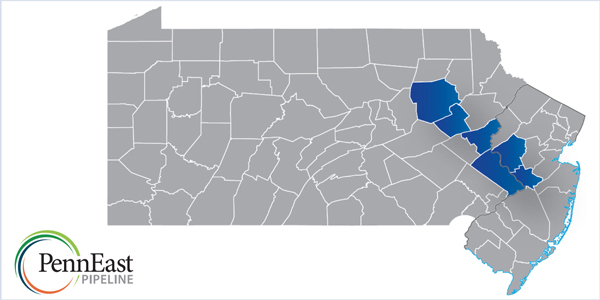By Rich Heidorn Jr.
The D.C. Circuit Court of Appeals on Tuesday rejected environmentalists’ claim that FERC is incented to award pipeline certificates because it collects its operating expenses from regulated parties.
Upholding a lower court ruling, the D.C. Circuit also rejected the Delaware Riverkeeper Network’s challenge to FERC’s use of tolling orders to meet its statutory deadlines for acting on rehearing applications (17-5084).
The case arose from PennEast Pipeline’s 2015 application with the commission to build a 114-mile natural gas pipeline through Pennsylvania and New Jersey. Riverkeeper, which works to protect the Delaware River and its tributaries, intervened in opposition.
In 2016, while FERC was still reviewing the application, the group filed a complaint in U.S. District Court alleging that the commission’s funding structure creates structural bias in violation of the Due Process Clause of the Fifth Amendment. Riverkeeper also said the commission’s use of tolling orders to satisfy its 30-day deadline for acting on rehearing applications violates its members’ due process rights.
FERC’s Funding Mechanism
Although it receives an annual Congressional appropriation, FERC is required to recover its costs from regulated industries. Riverkeeper said the structure creates improper incentives for FERC to approve more pipelines so that it could seek larger appropriations from Congress.
The district court dismissed the case for failure to state a claim, agreeing with FERC and PennEast that Riverkeeper had failed to identify any liberty or property interest protected by the Due Process Clause.
The D.C. Circuit agreed, citing the Supreme Court’s 1928 Dugan v. Ohio ruling, which concerned a mayor who served a judicial function as one of five members of a city commission. Although the mayor’s salary came from the same general fund in which fines were deposited, the court said the salary was “not dependent on whether [the mayor] convicts in any case or not.”
As in Dugan, the appellate court ruled, “the adjudicator does not control the funds collected,” because FERC’s fees and charges are “‘credited to the general fund of the Treasury,’ not placed into its own coffers. Moreover, the commission’s budget, like the mayor’s salary in Dugan, is fixed by a distinct legislative body.”
“Regardless of how many pipelines FERC may approve, it ‘shall’ charge, for each year, a total amount ‘equal to all of the costs incurred by the commission in that fiscal year,’” the court said.
Due Process Standing
The Due Process Clause forbids the federal government from depriving a person of “life, liberty or property without due process of law.”
Riverkeeper based its due process claim on the 1971 Environmental Rights Amendment to the Pennsylvania Constitution, which guarantees its citizens “a right to clean air, pure water and to the preservation of the natural, scenic, historic and esthetic values of the environment.”
But the court said the amendment “protects not private property rights, but public goods,” and therefore is “too vague and indeterminate to create a federally cognizable property interest.”
In addition, the court said, “the rights created by the amendment bind only state and local government, not the federal government. … For all of these reasons, we conclude that the Environmental Rights Amendment does not create federally protected liberty or property interests, much less ones that FERC could infringe.”
Tolling Orders
The court also rejected Riverkeeper’s challenges to the commission’s use of tolling orders, which grant rehearing for the limited purpose of giving the commission more time to consider such challenges. Riverkeeper complained that the process frustrates judicial review in violation of the Due Process Clause because FERC routinely allows construction to proceed while the rehearings are pending.
“Regardless of whether any protected liberty or property interests are implicated, the commission is not a structurally biased adjudicator, and its use of tolling orders is not facially unconstitutional,” the court said. “We have long held that FERC’s use of tolling orders is permissible under the Natural Gas Act, which requires only that the commission ‘act upon’ a rehearing request within 30 days, not that it finally dispose of it.”





